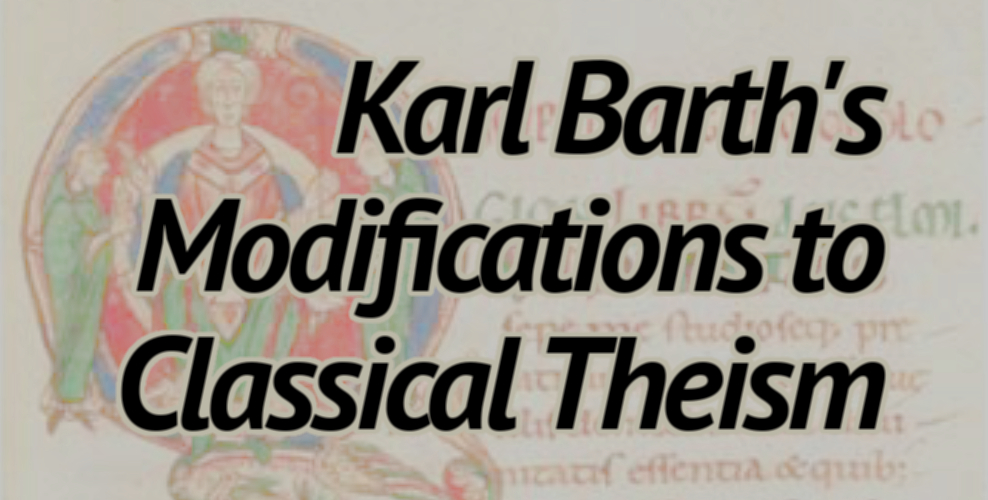 George Hunsinger provides an excellent summary of Karl Barth's modifications of Classical Theism in his new book, Reading Barth with Charity: A Hermeneutical Proposal, which I've provided in the quotation below. In the same chapter, Hunsinger also provides a definition of Classical Theism as Aseity, Simplicity, Immutability, Impassibility and Timelessness with references to Anselm's Monologion and Proslogion.
George Hunsinger provides an excellent summary of Karl Barth's modifications of Classical Theism in his new book, Reading Barth with Charity: A Hermeneutical Proposal, which I've provided in the quotation below. In the same chapter, Hunsinger also provides a definition of Classical Theism as Aseity, Simplicity, Immutability, Impassibility and Timelessness with references to Anselm's Monologion and Proslogion.
Barth's modifications are excellent improvements to each tenant of Classical Theism. His definition of aseity is inline with the Reformed Tradition, maintaining God's transcendence, yet this does not prevent God from also being the source of life. Simplicity for Barth also includes multiplicity, especially a trinitarian one. God's immutability does not make God a inanimate (i.e. dead) God that is motionless. God's impassibility does not prevent God from loving or experiencing in the suffering of the cross; This is an affirmation of Jürgen Moltmann's reappropriation of Luther's phrase "Crucified God." And lastly, Barth's timelessness clarifies time in relationship to eternity. Barth's 'recasting' of Classical Theism (as Hunsinger phrases) demonstrates that God is not a prisoner of His own perfections!
Barth found it possible (and necessary) to accept in modified form certain divine predications of classical theism.
Aseity. "God himself and he alone is the principle and source from which [he is] all that he is . . . eternally . . . in the act of his existence as the living God" (IV/3, 80). "This God has no need of us. This God is self-sufficient. . . . He is not under any need or constraint" (IV/1, 346).
Simplicity. "God is certainly simple," but not according to "the absolutized idea of simplicity" as found in classical theism (II/1, 450). "God in himself is not just simple, but in the simplicity of his essence he is threefold--the Father, the Son, and the Holy Ghost" (III/2, 218). Because his simplicity includes multiplicity in itself (II/1, 329), the living God is free to operate in multiple ways ad extra without ceasing to be perfectly indivisible in himself.
Immutability. God's immutability means that "he is always the same in every change" (II/1, 496). "He is what he is continually and self-consistently" (II/1, 494). Although he partakes freely in the alteration of creation, he does so as the Lord, so that his being and essence do not change along with creation, "He is what he is in eternal actuality. He never is it only potentially (not even in part)" (II/1, 494). Whatever God does ad extra, he does in accord with his antecedent being. His external works always correspond (entsprechen) to something "in his own essence" (II/1, 496). In all his external works he remains "rich in himself," never losing, altering, or contradicting himself (II/1, 495). God's immutability is "the constancy of his faithfulness to himself" as the triune God who loves in freedom (IV/1, 561). His constancy is both "ethical" and "ontological."
Impassibility. "[God] is absolute, infinite, exalted, active, impassible, transcendent, but in all this he is the One who loves in freedom, the One who is free in his love, and therefore not his own prisoner. He is all this as the Lord, and in such a way that he embraces the opposites of these concepts even while he is superior to them" (IV/1, 187). Barth agrees with classical theism that nothing apart from or opposed to God can cause him to suffer. He goes beyond classical theism, however, in positing that God freely and sovereignly takes human suffering into his own being through his union with humankind in the humanity of the incarnate Son. In and through the mediation of Christ, God takes suffering and death into his own being in order to triumph over them by destroying them. The impassible God becomes passible by grace. He truly suffers in Christ--in his divine being, not just in his humanity--but in so doing he remains strong to prevail. Suffering and death are destroyed in the annihilating fire of God's love. In this radicalized form Barth affirms with Cyril and Gregory of Nazianzus the suffering of the impassible God.
Timelessness. Although created time does not belong to God's eternal being, his being includes its own unique form of temporality. This unique time is "the [eternal] form of the divine being in its triunity." It is "a movement which does not signify the passing away of anything, a succession which in itself is also beginning and end" (II/1, 615). Without this inner eternal temporality, God as triune would not be the living God in himself (II/1, 638-39).
Hunsinger, George. Reading Barth with Charity: A Hermeneutical Proposal. Grand Rapids: Baker Academic, 2015. 131-33. Print.
Header Image Source: "Illuminated initial from Anselm's Monologion" by Hugo Pictor - Anselm of Canterbury's Monologion, manuscripted by Hugo Pictor, Jumièges scriptorium, late 11th century [1] downloaded from [2]. Licensed under Public Domain via Commons.



Leave a comment